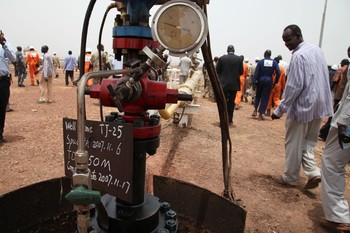South Sudan oil refinery delayed, equipment stranded in Kenya
July 11, 2013 (BENTIU) – The opening of an oil refinery in South Sudan’s Unity state, has been delayed from 9 July as vital equipment is stranded at the Kenyan port of Mombassa.

The South took with it 75% of Sudan’s oil production but none of the infrastructure needed to export or to refine its oil, for which there is a high demand in the country.
Since independence South Sudan has been forced to import fuel from neighbouring countries, often at a high cost.
Unity state’s deputy governor Michael Chiengjiek Geay told Sudan Tribune on Thursday that the postponement was due to vital equipment still not reaching the refinery.
During South Sudan’s second anniversary celebrations in Juba on Tuesday, president Salva Kiir Mayardit said that the country’s oil infrastructure has progressed significantly since separation from Sudan.
The Unity state refinery will now be inaugurated in August 2013, with the Tangrial oil refinery in the Melut area of Upper Nile state scheduled to open in 2014, Kiir said. Unity state produces South Sudan’s best quality petroleum but Upper Nile state is the largest producer.
The deputy governor told Sudan Tribune that he was concerned that some of the heavy equipment stranded in Mombasa will be difficult to transport now the seasonal rains have started.
Geay said that the Ministry of Petroleum and Mining in Juba is working hard to complete the refinery so that South Sudan can produce its own fuel, for national consumption.
The deputy governor said that once the purifying equipment arrives the construction will be completed and the refinery will be up and running within a very short time frame. It is hoped that, when complete, the two new refineries will reduce the cost of fuel in South Sudan.
In January 2012 South Sudan stopped exporting its oil through Sudan over a transit fee dispute. Tensions between Juba and Khartoum led to the north closing the border for trade forcing the price of oil to increase dramatically. Juba has been exploring the possibility of building a new pipeline to the Kenyan or Djibouti coast.
The lack of hard currency caused by the shutdown – oil revenues accounted for 98% of government income before the shutdown – has also affected the young nation’s ability to import vital items such as fuel and other commodities.
After a long impasse the two sides agreed a new oil deal in September last year but differences over security issues and disputed border areas, meant that oil production did not resume until May, following a further deal signed in March.
However, Sudan’s president recently threatened to permanently stop oil from the landlocked South Sudan crossing north Sudan’s territory, accusing Juba of continuing to back rebel groups fighting his government in South Kordofan, Blue Nile and Darfur.
Earlier this month South Sudan’s vice president, Riek Machar visited his Sudanese counterpart, Ali Osman Taha in Khartoum, where they reaffirmed their commitment to the previous agreements they had signed.
(ST)
